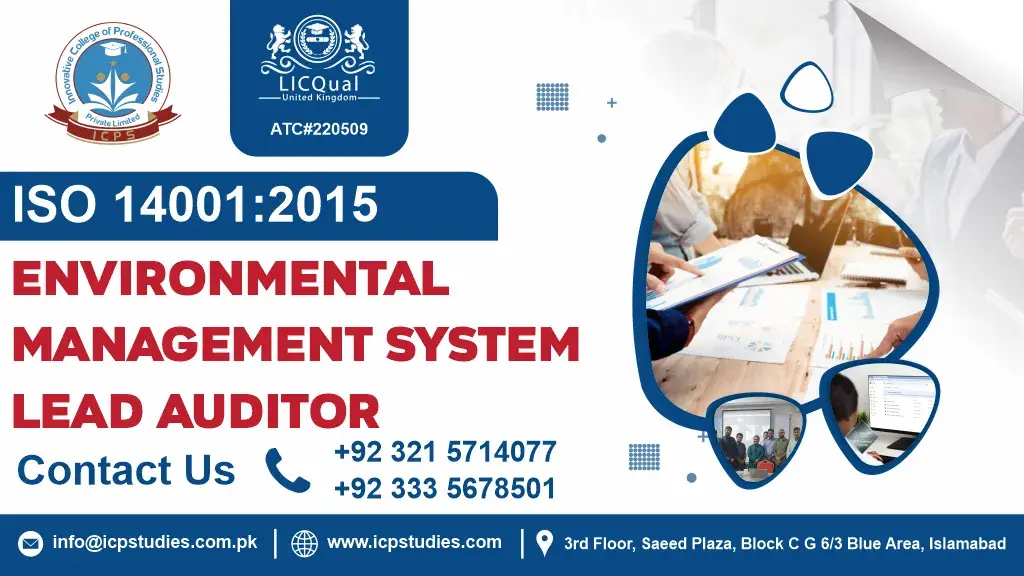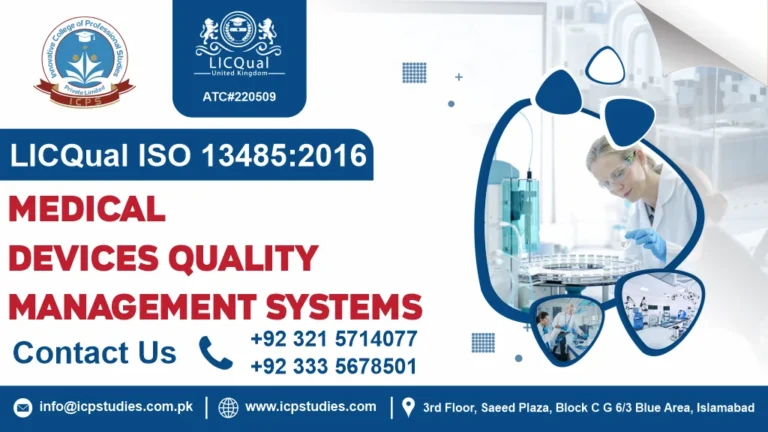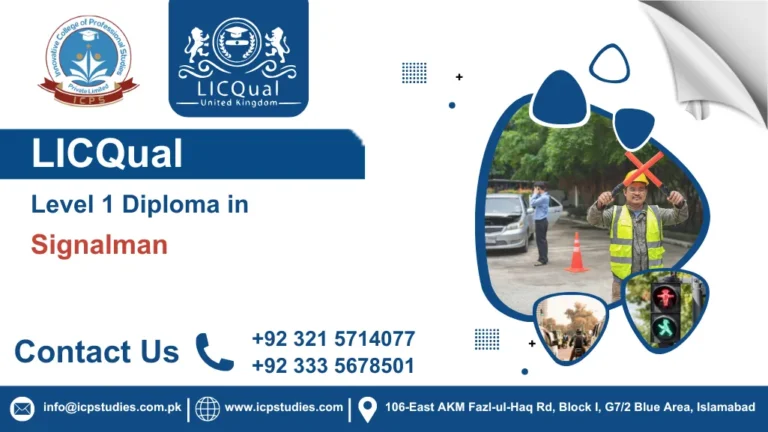Be a catalyst for change and help organizations reduce their environmental impact
Are you looking to become an expert in environmental management systems and auditing? Do you want to gain a competitive edge in your career? Look no further than our ISO 14001:2015 Environmental Management System (EMS) Lead Auditor course!
Our comprehensive course is designed to provide you with the knowledge and skills needed to become a proficient lead auditor in environmental management systems. With a focus on ISO 14001:2015, you’ll learn how to effectively audit organizations for compliance with environmental regulations and standards.
Our course is led by experienced instructors who have years of experience in the field. You’ll receive practical, hands-on training that will prepare you to conduct audits with confidence. Whether you’re an environmental professional looking to advance your career or a business owner seeking to improve your organization’s environmental performance, this course is for you.
Upon completion of the course, you’ll receive a certificate of completion that demonstrates your expertise in environmental management system auditing. This certification can help you stand out in a competitive job market and open up new career opportunities.
Don’t wait any longer to take your career to the next level. Enroll in our ISO 14001:2015 Environmental Management System (EMS) Lead Auditor course today and start on the path to success!
All About ISO 14001:2015 Environmental Management System (EMS) Lead Auditor
Key Takeaways
Course Overview
The ISO 14001:2015 Environmental Management System (EMS) Lead Auditor course stands as a comprehensive training endeavor meticulously crafted to equip individuals with the knowledge and skills essential for proficiently auditing environmental management systems.
Tailored to align with the requisites of the ISO 14001:2015 standard, this course furnishes participants with a deep understanding of EMS requirements. Moreover, it delves into auditing techniques imperative for evaluating the efficacy of an organization’s environmental management system and pinpointing areas for enhancement.
Ideal for individuals tasked with conducting internal or external audits of environmental management systems, including auditors, EMS managers, quality assurance professionals, and other stakeholders involved in EMS implementation and enhancement, this course offers invaluable insights and expertise.
Completion of the ISO 14001:2015 Environmental Management System (EMS) Lead Auditor course empowers participants with a comprehensive grasp of the ISO 14001:2015 standard, environmental management system principles, and auditing methodologies crucial for conducting effective EMS assessments. Armed with this knowledge, participants are poised to make substantial contributions to ongoing EMS improvement efforts and drive reductions in organizational environmental impact.
In essence, the ISO 14001:2015 Environmental Management System (EMS) Lead Auditor course is an indispensable training program for individuals engaged in environmental management, auditing, or quality assurance roles. By equipping participants with the requisite knowledge and skills, the course facilitates effective auditing and enhancement of environmental management systems while ensuring adherence to international standards.
The entry requirements for the ISO 14001:2015 Environmental Management System (EMS) Lead Auditor course typically include:
- Educational Background:
- A minimum of a high school diploma or equivalent; however, a degree in environmental science, management, engineering, or a related field is often preferred.
- Professional Experience:
- A minimum of two years of work experience in a relevant field, including experience in environmental management or quality assurance.
- Prior Training:
- Completion of a recognized ISO 14001:2015 EMS Internal Auditor training course is usually required before enrolling in the Lead Auditor course.
- Understanding of ISO 14001:2015:
- Familiarity with the principles and requirements of the ISO 14001:2015 standard is essential.
- Language Proficiency:
- Proficiency in English, both written and spoken, is typically required. Non-native speakers may need to provide evidence of their language skills (e.g., an IELTS score of 6.0 or equivalent).
- Motivation Statement:
- A brief statement outlining the applicant’s interest in environmental management and how the Lead Auditor training will contribute to their professional development may be encouraged.
- Organizational Support:
- For those seeking to become Lead Auditors, support from their organization for practical experience in conducting environmental audits may be beneficial.
For the most accurate and specific information, it is advisable to consult the training provider or certification body offering the ISO 14001:2015 Lead Auditor training.
Mandatory Units
ISO 14001:2015 Environmental Management System (EMS) Lead Auditor Course Content
Module 1: Introduction to Environmental Management Systems
1.1 Overview of Environmental Management Systems (EMS) 1.2 Benefits of Implementing an EMS 1.3 EMS Standards and Regulations 1.4 ISO 14001:2015 Requirements 1.5 EMS Documentation Requirements 1.6 EMS Implementation Strategies
Module 2: Environmental Auditing Principles and Techniques
2.1 Overview of Environmental Auditing 2.2 Types of Audits 2.3 Audit Principles and Techniques 2.4 Audit Planning and Preparation 2.5 Conducting the Audit 2.6 Audit Reporting and Follow-up
Module 3: ISO 14001:2015 Requirements and Interpretation
3.1 Context of the Organization 3.2 Leadership 3.3 Planning 3.4 Support 3.5 Operation 3.6 Performance Evaluation 3.7 Improvement
Module 4: Environmental Management System Documentation
4.1 Documentation Requirements of ISO 14001:2015 4.2 Document Control 4.3 Record Keeping
Module 5: Environmental Aspects and Impacts
5.1 Definition of Environmental Aspects and Impacts 5.2 Identification of Environmental Aspects 5.3 Environmental Impact Assessment 5.4 Significance Evaluation
Module 6: Environmental Legal Compliance
6.1 Overview of Environmental Legal Compliance 6.2 Environmental Legislation 6.3 Compliance Obligations 6.4 Compliance Evaluation and Monitoring
Module 7: Environmental Management System Internal Auditing
7.1 Internal Audit Planning and Preparation 7.2 Conducting the Internal Audit 7.3 Internal Audit Reporting and Follow-up
Module 8: Environmental Management System Certification Audit
8.1 Certification Audit Planning and Preparation 8.2 Conducting the Certification Audit 8.3 Certification Audit Reporting and Follow-up
Module 9: EMS Continual Improvement
9.1 Continual Improvement Principles 9.2 Corrective Action and Preventive Action 9.3 Management Review
Module 10: Exam Preparation and Review
10.1 Review of Course Material 10.2 Exam Format and Preparation 10.3 Practice Exam Questions and Answers 10.4 Exam Tips and Strategies
Learning Outcomes
ISO 14001:2015 Environmental Management System (EMS) Lead Auditor course is designed to equip individuals with the knowledge and skills required to audit an organization’s EMS in line with the requirements of ISO 14001:2015. The course covers the principles, concepts, and requirements of an EMS, and it enables participants to understand the audit process, including planning, conducting, and reporting an audit.
By the end of the ISO 14001:2015 Environmental Management System (EMS) Lead Auditor course, participants will be able to:
- Understand the principles and concepts of EMS: Participants will be able to explain the key concepts and principles of EMS, including the PDCA cycle, risk-based thinking, and the concept of continual improvement.
- Interpret the requirements of ISO 14001:2015: Participants will be able to interpret the requirements of ISO 14001:2015 and explain how they apply to an organization’s EMS.
- Plan an EMS audit: Participants will be able to plan an EMS audit, including developing an audit plan, identifying audit objectives, and selecting the audit team.
- Conduct an EMS audit: Participants will be able to conduct an EMS audit, including collecting and verifying audit evidence, identifying nonconformities, and documenting audit findings.
- Report an EMS audit: Participants will be able to report an EMS audit, including preparing an audit report, communicating audit findings, and verifying corrective actions.
- Apply audit skills in a real-world environment: Participants will be able to apply the audit skills learned during the course in a real-world environment, including auditing an organization’s EMS in line with the requirements of ISO 14001:2015.
- Enhance their career prospects: By completing the ISO 14001:2015 Environmental Management System (EMS) Lead Auditor course, participants will have gained the necessary knowledge and skills to pursue a career as an EMS auditor. The course will enhance their career prospects and enable them to contribute to the environmental sustainability of organizations.
The ISO 14001:2015 Environmental Management System (EMS) Lead Auditor course is designed for professionals and learners who want to enhance their knowledge in environmental management, sustainability, and regulatory compliance. It equips participants with practical auditing skills and prepares them to lead environmental audits, ensuring organizational compliance and continuous improvement.
Environmental Managers
This course is ideal for environmental managers who want to strengthen their expertise in implementing and maintaining EMS. Benefits include:
- Learning how to plan, implement, and monitor environmental management systems effectively.
- Understanding ISO 14001:2015 standards and ensuring organizational compliance.
- Identifying environmental risks and implementing preventive measures.
- Improving resource efficiency and reducing environmental impact.
- Leading internal and external environmental audits confidently.
- Developing strategies for continual improvement in environmental performance.
- Enhancing skills to report audit findings to senior management.
- Gaining globally recognized certification to validate professional competence.
Internal Auditors
This course is perfect for internal auditors looking to elevate their auditing skills:
- Learning advanced techniques to plan and conduct environmental audits.
- Understanding how to evaluate compliance with ISO 14001:2015 standards.
- Identifying non-conformities and recommending corrective actions.
- Developing skills to document audit findings clearly and accurately.
- Learning to assess environmental risks and sustainability performance.
- Gaining confidence to lead audit teams and coordinate audit activities.
- Enhancing credibility within the organization as a certified lead auditor.
- Preparing for future roles in environmental management and consultancy.
Sustainability Officers
Sustainability officers can benefit from this course by gaining auditing expertise that supports environmental goals:
- Understanding the role of audits in achieving corporate sustainability objectives.
- Learning to measure environmental performance and sustainability initiatives.
- Evaluating organizational compliance with environmental regulations.
- Identifying opportunities for resource optimization and waste reduction.
- Reporting environmental performance improvements to stakeholders.
- Developing skills to support strategic sustainability planning.
- Enhancing knowledge to advise senior management on sustainable practices.
- Preparing to lead audits that directly impact organizational sustainability.
Compliance Officers
Compliance officers tasked with environmental regulations will gain:
- Deep understanding of ISO 14001:2015 requirements and regulatory standards.
- Skills to identify compliance gaps and non-conformities.
- Techniques for monitoring environmental performance and risk management.
- Methods to ensure corrective and preventive actions are implemented.
- Ability to report audit findings accurately to regulatory authorities.
- Knowledge to align audits with organizational policies and legal requirements.
- Expertise to reduce organizational risk and avoid environmental penalties.
- Recognition as a certified professional in environmental management auditing.
Consultants
Environmental and sustainability consultants can leverage this course to enhance advisory services:
- Gaining in-depth knowledge of ISO 14001:2015 auditing requirements.
- Learning to conduct audits for multiple clients across industries.
- Advising organizations on compliance, risk mitigation, and best practices.
- Identifying gaps in EMS implementation and recommending improvements.
- Building credibility as a certified lead auditor with international recognition.
- Expanding consulting services to include environmental audit management.
- Improving client sustainability and compliance outcomes.
- Developing leadership skills for managing audit teams and projects.
Senior Management and Executives
Executives and decision-makers can benefit from understanding the strategic value of audits:
- Learning how environmental audits impact business performance and risk management.
- Gaining insights into regulatory compliance and organizational sustainability.
- Understanding audit results to inform strategic decision-making.
- Supporting organizational environmental initiatives with actionable recommendations.
- Enhancing knowledge of corporate responsibility and ESG reporting.
- Identifying opportunities for cost savings through resource efficiency.
- Developing strategies to integrate audit findings into business processes.
- Building credibility with stakeholders by promoting compliance and sustainability practices.
Students and Graduates
Aspiring environmental professionals can use this course to kickstart their careers:
- Developing specialized auditing skills aligned with ISO 14001:2015 standards.
- Enhancing employability in environmental management and sustainability roles.
- Gaining practical knowledge of EMS implementation and auditing processes.
- Preparing for roles such as Lead Auditor, Environmental Consultant, or Compliance Officer.
- Building confidence to conduct audits and report findings professionally.
- Acquiring a globally recognized certification to add value to academic and professional portfolios.
- Learning how to support organizations in achieving sustainability objectives.
- Increasing competitiveness in the global environmental management job market.
FAQs Related to ISO 14001:2015 Environmental Management System (EMS) Lead Auditor







